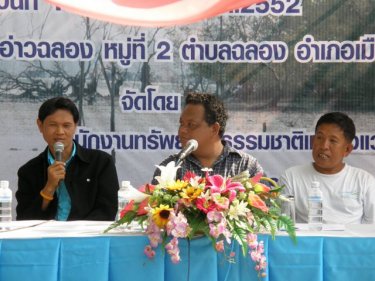THE GOVERNOR, Dr Preecha Ruangjan, said today that if it was within his power, he would slow down the speed of property development on Phuket.
He added that given the realities of the modern world, Phuket could not avoid development, but the island needed to pay greater attention to quality.
''If I was asked whether Phuket needs to develop or not, I would say the island needs to develop, but in the right way,'' the governor told a gathering of about 300 local people at Palai beach in Chalong today.
He said Phuket people had allowed investors from other parts of Thailand and overseas to start projects that did not necessarily protect the best long-term interests of Phuket.
''I try to tell Phuket people every chance I get, 'If you care about your island's future, you need to consider what you permit to happen to the island today.'''
He said Phuket was like an overfilled glass of water, with 324,000 registered locals plus hundreds of thousands of others working here, or coming as tourists.
''We don't have the natural resources to support a group of that size,'' he said. ''Do you know that Phuket will have a problem with its water supply within 20 or 30 years?
''We cannot supply the needs of everyone.''
Every advance that came Phuket's way came at a price, he said.
''Phuket people should ask themselves what price they are paying for today's rapid development.''
He said development on Phuket should be slower, with a balance maintained with Phuket's natural environment.
''If we can strike a balance with nature, we can overcome all the problems,'' he said.
Dr Preecha helped to plant 11,000 trees and mangroves as part of a coastal revitalisation project, near the Palai seafood restaurant. He and locals also set free one million small shrimp to improve the marine environnment.
Local fishing group chief Sutapateep NaTalang said people these days were more selfish and had made Phuket more like a big city than a traditional village.
''Everybody thinks about money now,'' he said. ''In the temple once, when there was a ceremony, everybody would come to help for free.
''Today people ask for money for everything they do.
''Our culture is being changed for the worst.''
He added that the number of people coming to Phuket had pushed up the cost of living. Because people were struggling with price rises or wanted to make a profit, they encroached on mangrove forests.
Thailand was not the only country with these problems, Khun Sutateep said. Sustainable lifestyles were hard to maintain everywhere.
''In the Philippines, fishermen can no longer catch enough fish each day to make a living. They catch one kilo per day person. It is turning fishermen into beggars.''
This was a chain reaction caused by too much damage to the environment.
''Phuket does not have a strategy for future development,'' he said. ''In the future, the same problem will spread to Phang Nga Bay as well.''
He added that given the realities of the modern world, Phuket could not avoid development, but the island needed to pay greater attention to quality.
''If I was asked whether Phuket needs to develop or not, I would say the island needs to develop, but in the right way,'' the governor told a gathering of about 300 local people at Palai beach in Chalong today.
He said Phuket people had allowed investors from other parts of Thailand and overseas to start projects that did not necessarily protect the best long-term interests of Phuket.
''I try to tell Phuket people every chance I get, 'If you care about your island's future, you need to consider what you permit to happen to the island today.'''
He said Phuket was like an overfilled glass of water, with 324,000 registered locals plus hundreds of thousands of others working here, or coming as tourists.
''We don't have the natural resources to support a group of that size,'' he said. ''Do you know that Phuket will have a problem with its water supply within 20 or 30 years?
''We cannot supply the needs of everyone.''
Every advance that came Phuket's way came at a price, he said.
''Phuket people should ask themselves what price they are paying for today's rapid development.''
He said development on Phuket should be slower, with a balance maintained with Phuket's natural environment.
''If we can strike a balance with nature, we can overcome all the problems,'' he said.
Dr Preecha helped to plant 11,000 trees and mangroves as part of a coastal revitalisation project, near the Palai seafood restaurant. He and locals also set free one million small shrimp to improve the marine environnment.
Local fishing group chief Sutapateep NaTalang said people these days were more selfish and had made Phuket more like a big city than a traditional village.
''Everybody thinks about money now,'' he said. ''In the temple once, when there was a ceremony, everybody would come to help for free.
''Today people ask for money for everything they do.
''Our culture is being changed for the worst.''
He added that the number of people coming to Phuket had pushed up the cost of living. Because people were struggling with price rises or wanted to make a profit, they encroached on mangrove forests.
Thailand was not the only country with these problems, Khun Sutateep said. Sustainable lifestyles were hard to maintain everywhere.
''In the Philippines, fishermen can no longer catch enough fish each day to make a living. They catch one kilo per day person. It is turning fishermen into beggars.''
This was a chain reaction caused by too much damage to the environment.
''Phuket does not have a strategy for future development,'' he said. ''In the future, the same problem will spread to Phang Nga Bay as well.''





Wise words, but did someone listen? I am afraid of the future for Phuket.
Posted by Fritz Pinguin on February 23, 2009 18:45